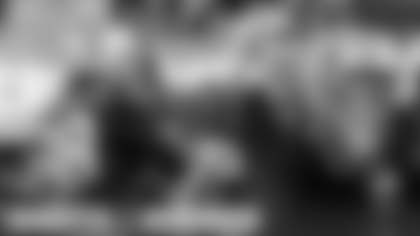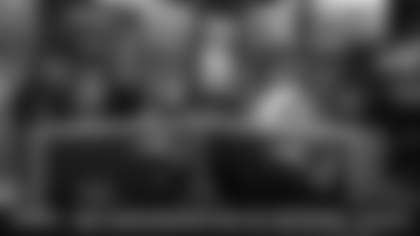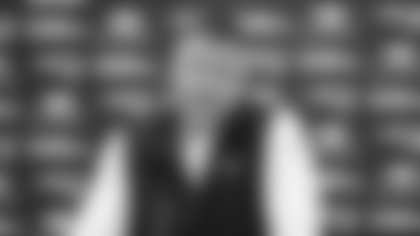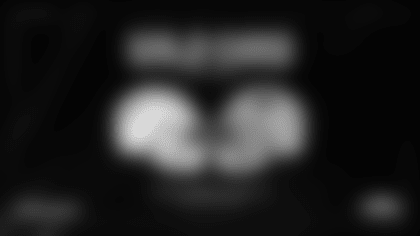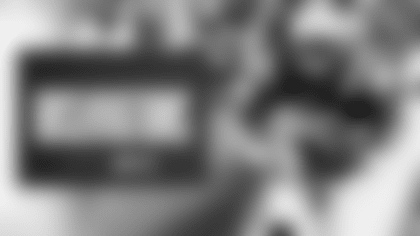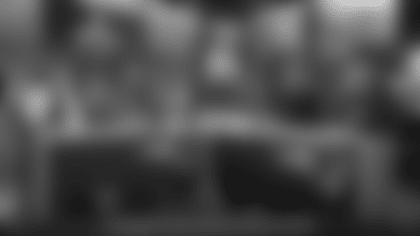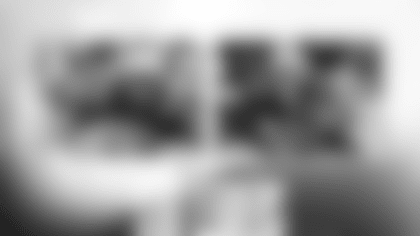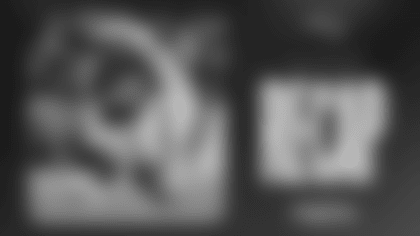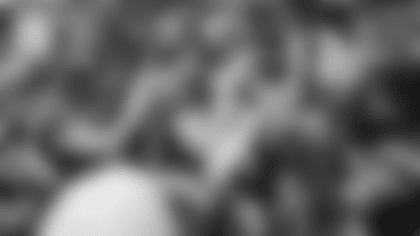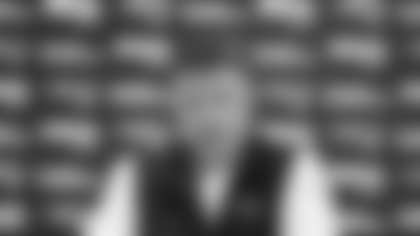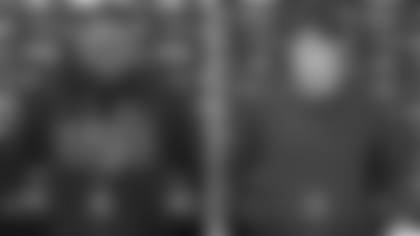[

]()
BB: No updates on the injury report. We got some good work in yesterday in some windy conditions. I don't know when those are going to hit, but I'm sure they'll be here sooner or later, so it made for an interesting day out there in practice. I feel like we're starting to get caught up again today. You know, yesterday was a real scramble with the short week and I don't think we're totally back to normal from a preparation standpoint, but I think we're getting there. The Jets are a tough team to prepare for, they do a lot of things well, as I said yesterday, with all their plays in the kicking game and they give you a lot of those offensively, they really give you a lot of things to defend, a good running game, a good passing game, a lot of different formations and all of that, so that's pretty much where we're at for today.
Q: Did you ever have an occasion to meet (Johnny) Unitas? What is your recollection of him?
BB: Yeah, sure, growing up in that area, every kid wanted to be Johnny Unitas out there in the backyard throwing the ball. My dad had a football camp when I was kid over at Washington College in Chestertown, and Johnny [Unitas] came over for a day to help with the kids and take pictures, sign autographs and all that, I got to snap to him, and he's quite a guy. Of course I was with the Colts in '79, and he still had his Golden Arm restaurant and he was around. I think of all the superlatives that Don Shula and everybody that have thrown out about Unitas in the last 24 hours, or however long it's been, it's hard to add anything to that, he's the master of the two-minute drill, as great a passer as you're ever going to see, all the wide receivers, the backs, the tight ends, he used them all, he hit them all, he could throw to everything. He was great leader, a great two-minute guy, and he had a presence on the field, it seemed like he always did the right thing, a great career.
Q: Was Johnny Unitas kind of an icon that you were in awe of when met him?
BB: I think a lot of those guys with the Colts fall into that category, Lenny Moore, [Jim] Mutscheller, and of course Raymond Berry, and all the defensive guys they had, they had that defensive line, you know, [Gino] Marchetti?, and "The Big Batty", and Ordell Braase, Bill Pellington. They had a good football team, they were good every year, but Johnny clearly was the guy who was the spark for them and was a guy that as a fan, you always felt that you could count on him to get the team down the field, and if they needed a field goal, get them into field goal range, and if they needed a touchdown, get them into the end zone. I remember probably the '58 Championship game as the first pro game that I really remember, or '59, '58 okay, the sudden death elimination. That's the first pro game I really remember watching, so he did it that day and a lot of other ones.
Q: Is the two-minute drill what separates the quarterbacks?
BB: I think it's one of the things, it's part of the package, it's certainly one of the things. That's when the quarterback has control of the other 10 guys on the field and a lot of preparation goes into that situation but, again at that point, he's running the show, sometimes he's calling the plays, and I'm sure he was back then, now it's a little different with the coach and quarterback radio system, but he's calling the plays, making the decisions, things are going real quick in terms of using time outs and making decisions on whether to throw the ball and try to get it out of bounds, or throw it inbounds where you can get more yardage and so forth and so on, we've all seen a hundred of them. It certainly is a big part of the stamp of the quarterbacks, his legacy and his reputation.
Q: A professor from Cal Berkeley just published a study on going for it on fourth and short. As both a coach and an economics major, can you point to any flaws in the professor's theory?
BB: I saw it, I read it, I don't know much of those math equations. I understood, well, not very much, I'll tell you that right now. But I think I understand some of the points that were made in there, and I think he has some valid points. There's sometimes an emotional aspect, and momentum, if you will, to those decisions, but I'm not sure how to calculate that. One of the points he was making was that if you go for it, particularly when you're inside the opponents 20, even if you come up short, you've got them backed up, they got 80, 90 yards to go. Do the mathematical percentages of them scoring in that situation versus you getting the ball, and so forth and so on, and that's a valid point. On the other hand to go down there and get nothing out of it, psychologically there's an impact there on your team. I think we saw that Monday night, there might have been more to Pittsburgh not scoring on the one-yard line then them just not scoring on the one-yard line and that mathematical equation. So, I understand the points that he's made, I don't understand all the mathematical equations how he got to those points, but I think that some of those are legitimate points and you just have to evaluate the situation to your team the team you're playing and so forth, to try to . . .but I see where a lot of that's coming from. Nobody ever said we were smart, just trying to do the right thing
Q: Can you talk about the play of Jarvis Green in the preseason and the first game?
BB: I think Jarvis [Green] had a pretty good camp, he missed a little bit of time and I think one preseason game, but for the most part he's been able to stay on the field, get a lot of reps and really improve. You know, Romeo's [Crennel] done a good job with Jarvis, as he does with any young lineman. I think Romeo's clearly one of the top coaches in the league. He does a tremendous job with young players and he can really get the most out of them and I think Jarvis has done a good job of taking the coaching, both from Romeo and from Pepper [Johnson] and also from some of the veteran guys like Anthony [Pleasant] and Bobby Hamilton and guys like that, but he's worked hard, he's a kid that's got some explosion, and he showed up there in preseason, and you know, he had a decent preseason, he didn't get very many plays the other night, but he was able to take advantage of the ones he did have and have some production on them. He's had a good steady camp, I don't know if I can say it's been a big surprise because we expected that he would be competitive, but we'll see how it goes, we've got a long way to go and hopefully he can keep improving.
Q: Can you talk about Kevin Mawae's play?
BB: Well I think Kevin's, from being with him two years, he's really an outstanding football player. He's a real good center, no weaknesses, he's good in the running game, he can reach guys, move them off the line of scrimmage. He can pull, he's an excellent pass protector, has good leadership, is a smart guy, makes all the calls, and can direct the line and make their adjustments that they need to do, he thinks quickly on his feet, he's a good decision maker, the ball's never an issue. He's pretty good, he brings a lot of intangibles, not only to the line, but I think to the entire offense and the entire team. He's a real solid person, and a real good football player and combined together he's, I'm sure, one of the best in the league. He's got a lot to offer. I think he probably had as much to do with our success in '98 as anybody, coming in and just not only giving a lift to us on that side of the ball, but again some of the intangible things that he brought. I don't think there's any way you can underrate what he's done.
Q: Can you follow that up with the Richard Seymour/Kevin Mawae match up? How does that play out for Richard?
BB: I think Richard will be going up against one of the top lineman in the league. A guy who's smart and savvy, and a guy who also has a lot of skill, and is a good player, but Kevin really knows how to play and he knows how to take advantage of you. Every little advantage he can get, he knows how to use it. But Richard's come along too, so it'll be a good battle, but Richard will definitely be going against a top player who's got a lot of quickness who's got good strength and really knows what he's doing. He's not out of position very often.
Q: Realizing it is still early, is Donald Hayes giving you what you expected at this point?
BB: Well, we thought that Donald [Hayes] would be able to give us some depth at the wide receiver position, and make some plays. He brings a certain presence to our receiver group that we really don't have in terms of size, height, and wing span, and his ability to get some high balls and create some mismatches that our other guys are just built differently, they have different skills. I think he's come in and provided that element for us. He's still in the learning process of getting adjusted and adapting to our offense which is quite a bit different than the one he ran the last four years in Carolina. He's shown up in every game he's had an opportunity to, and that's really what we need from him.
Q: Who would say is the best defensive tackle you've ever coached?
BB: Well, I'd have to put Joe Herman up there, I'd have to put Ruben Carter up there, because he was pure nose at Denver. He never really played at guard, I don't know if that would have been his thing, but as a pure nose, he was pretty good. Leonard [Marshall] was a decent player at the Giants, but he played on the tackle.
Q: Is there anything that those players have done that Richard can't do?
BB: Well I think Richard is a little bit unique for the position because he's so tall, and he also has long legs, some of those tall guys are a little longer in the torso and a little shorter in the legs, so they may be 6'2" from the waist down, but . . . Richard is tall but he's also long legged and he's a powerful guy, but I think he's kind of unique. I think a lot of the tackles inside you see are guys that are quicker, they may be smaller and quicker, where they're not quite as rangy as Richard is, and they probably don't have the same kind of power that he has, he's a guy when we drafted him, we thought that he could play in, and I think he could because he has the frame, he runs well enough, he's got the long arms, he can handle those big tackles, but he also has the skills to play inside and I think it's tough to find people that have that kind of versatility, so even though he's a tackle, he could be an end, and if he were an end, we'd be saying, 'oh, well he could be a tackle' and probably be pretty good at both positions, and when I think you start listing those guys, there aren't a lot of guys that have that flexibility that have his kind of size.
Q: Have there been any guys like Richard Seymour?
BB: Oh, I think there are other people like that. Guys like Leon Lett, he was a big, tall inside defensive tackle. So I think there are guys like that, but I haven't coached them, we didn't have anybody . . .I mean everybody we had at the Jets we have them here, so we know who that is. At Baltimore, Mike Barnes, a kid like that out of Miami, a real good pass rusher, but he wasn't as powerful as Richard. Joe Herman is . . .and again we're going back, those guys were big and they were 260, 260 now and you're talking about a linebacker. From that aspect of it, from the size, the game's changed a little bit. And that's not to minimize their play either.
Q: When you're preparing for a team, how much goes into studying the head coach as opposed to the personnel?
BB: I think it's important that you study all the decision makers whoever the decision makers are. Sometimes it's the head coach, sometimes it's the coordinator, sometimes it's the position coach, and I think it's helpful to know what they like to do and what their track record's been, what their history's been. And a lot or times that can certainly give you a jump and an indicator of maybe what might be coming from that. For example, we know that line coaches . . .a line coach kind of responsible for the running game, so you see a line coach go from one team to the next, how often do you see that running game go from one team to the next? Or say the Steelers for example. Dick Hoak, he's been there, since they've invented the game, probably 50 years, and that running game, even though they might have changed coaches in one way or another, at different positions offensively different coordinators and all that. The running game has stayed pretty constant, so you got to think Dick Hoak has got a lot to do with that running game because it doesn't matter if the coordinator is [Kevin] Gilbride, whether it's Tom Moore, or whether it's [Mike] Mularkey, whether it was Ron Erhardt, whoever it was, there have been a lot of them there, but the running game has never really changed. You look at a guy like Dick Hoak and you know the coach. Whether it's the assistant coach, the head coach, the coordinator, yea I think you study them if you think they're the decision makers, and they're the guys who are affecting the game plan. The same thing with pass protections too, you see a new coach or a new line coach, it could be a head coach, whoever the decision maker is, you see him switch teams, a lot of times those protections go with them. They're different from the protections that somebody else used when they were there.
Q: Can you compare Vinny Testaverde's qualities to Tom Brady's qualities?
BB: I would say Vinny [Testaverde] probably has no weaknesses as a quarterback. He's big, he's athletic, he's fast, he's strong, he's got great throwing mechanics, he's accurate, he's tough, he's got good leadership qualities, he's smart, he's a team player, he understands what you need to do to win, whether those are his stats or not. I don't think he, that's not what's important to him, you can't sit there and say, 'well he can't do this or he can't do that.' He can throw every route, he can throw every type of pass he wants. I don't think he has any real weaknesses as a quarterback. He's good on play-action, and again, a lot of that goes to his overall athleticism. This is a guy who has put up some big numbers scrambling early in his career, not that he does that now, but that's indicative of the type of athleticism that he has. Vinny's a big man now, he's 6'5" 235, put together, strong. There's a reason why he was the first pick in the draft
Q: Do you think that Tom [Brady] has those qualities or is he approaching that level?
BB: Well, I'm just saying from a pure talent standpoint, I don't know how many quarterbacks you can put ahead of Vinny in terms of just pure talent, size, speed, athleticism, touch, throwing mechanics, accuracy, you can put him right up there with whoever you want to put next to him. I think he'd match, and for a long period of time too, how long has he been in the league, 15 years I think, and still going strong. He can do all those things. I think Tom [Brady] obviously has a lot of good quarterback skills, but I wouldn't put too many people in Vinny's category athletically and physically with the talent that he has. He's pretty unique, pretty rare.




